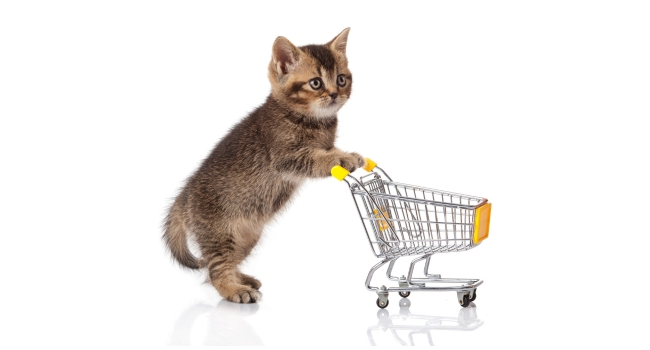Cats are undoubtedly one of the most popular animals on the planet, and they happen to be really cool pets too! One thing that separates cats from other pets, though, is the fact that they can be picky eaters – but what about corn?
Can cats eat corn?
Actually, it's not as simple as you might think! There are some cases in which cats can be fed corn and even enjoy it, but this is generally not the case with most felines.
Plus, there are various concerns about giving your cat corn, including if the animal has diabetes or other health issues or if they’re overweight or undernourished.
Want to learn more? Keep reading!
Can Cats Eat Corn?
The short answer is yes—as long as your pet is an adult and there are no medical risks to feeding them a moderate amount of corn.
While it is safe for cats to eat corn, it should be given as a snack and not as a meal replacement. However, too much of this could give your kitty digestive issues.
What are the Nutritional Benefits of Corn for Cats?
Corn is a grain that is rich in dietary fiber, thiamine, magnesium, folate, vitamin C, and phosphorus. These nutrients in corn are not available to cats.
Cats are obligate carnivores which means that their bodies cannot absorb or utilize any nutrients from plants or vegetables. However, corn has an abundance of dietary fiber which might help with their digestion and regulate their bowel movements.
What Quantity of Corn is Safe for Cats?
Cats are obligate carnivores, meaning that their bodies cannot process plants well and must get their nutrients from animal sources such as meat.
The more often a cat eats corn or other plant-based products like fruit or vegetables, the more likely it is to have gastrointestinal upset or other health problems due to its inability to digest these foods properly.
However, that doesn't mean that your pet can't have a nibble of corn now and then. Cats may enjoy the occasional chunk of corn, but the quantity should not exceed 7-10% of their total daily food intake.
The following table provides more guidance:

Which Corn Snacks are Safe for Cats?
Corn Chips
Several human foods are not safe for cats to eat due to their ingredients, including corn chips, which contain harmful ingredients such as salt, spices, and preservatives. These ingredients are harmful to a cat and can lead to health complications if ingested.
Sweet Corn
You can feed sweet corn to your cat as long as it is boiled or grilled, removed from the cob, and without any seasoning. Sweet corn will still taste good and retain most of its nutritional value when served plain.
Popcorn
Many types of popcorn aren't safe for cats to eat because they're laced with butter and salt, which can upset their stomachs.
The safest type of popcorn for your pet to eat is plain cooked popcorn.
Consider avoiding flavored popcorn, cheese, and butter, since they are likely to make sensitive digestive systems worse and might result in vomiting or diarrhea.
Tortillas and Cornbread
Cats should not be given bread of any kind, including tortillas, tacos, and quesadillas, because bread is low in carbohydrates and has no nutritional value. Giving your cat bread can provide the feeling of fullness but doesn't have any other benefits, and can cause digestive upset.
Candy Corn
Candy corn is an example of a food that is not safe for your cat to eat. Candy corn contains high amounts of sugar and additives that can be toxic for your cat to eat. The sugar in candy corn is bad enough by itself, but the additives can be deadly to your kitty when ingested.
Cornmeal
While it may seem like an easy way to feed your pet, cornmeal is not recommended as a food for cats. Cornmeal has a poor nutritional value and can lead to undesired weight problems in your pet.
Canned and Frozen Corn
It is safe to feed frozen corn to cats as long as you don't give it to them when it is still cold. Canned corn is also good as a snack for cats because they are able to drink a lot of water while they eat.
Corn Dogs
Corn dogs are not a good choice for your cat because they contain processed sausage and are made from fried corn batter. Cats can't eat most fried foods because it's hard on their digestive system and contains a lot of harmful ingredients.
Fried Corn Kernels
Despite their name, fried corn kernels are not good for your pet! They contain high amounts of sodium and fats which can lead to obesity and other health issues. Additionally, they contain other ingredients which can make your pet sick.
Can Cats Eat Corn Husks?

There are several potential side effects from consuming corn husks, including vomiting, diarrhea, drooling, and loss of appetite. Corn husks can even lead to intestinal blockage if eaten in excess or if the husk is too thick for the digestive tract to pass through. As a result, cats should not consume corn husks.
Can Kittens Eat Corn?
It's always good to know what your kitten can and can't have as far as solid food goes. Corn, for example, should be avoided at all costs with kittens.
Kittens need to eat a diet that includes animal proteins in order to grow properly and healthily.
Corn does not provide nutritional benefits and it is an unhealthy choice for a kitten as it can lead to stunted growth and various developmental issues.
Does Commercial Cat Food Contain Corn?
Corn is much cheaper than animal muscle meat so it is an easy way for companies to cut corners and save money.
Corn is often included in pet food as filler and does not provide any nutritional value to your pet.
Although the use of corn in commercial cat food may be more economical for the company that produces it, it is not always the most beneficial for your pet and can lead to health problems for some cats.
Are There Risks Associated With Cats Eating Corn?

While cats can eat corn, you should be aware of some potential risks before deciding whether or not to feed your cat corn.
- Gastrointestinal Problems
- Accidental Choking
- Allergic Reaction
Gastrointestinal Problems
Most felines are strict carnivores, meaning they need a high amount of animal protein in their diet. This means it can be dangerous for kitties to consume too much corn because it’s difficult for their bodies to process.
In particular, corn can have a negative impact on your cat’s gastrointestinal tract and cause severe stomach pain—even constipation and vomiting—among other painful symptoms.
Other symptoms may include
- Diarrhea
- Bloating
- Loss of appetite
- Sudden shifts in weight
- Compromised digestion
Accidental Choking
It can be a dangerous business to feed your cat corn because of its texture. Popcorn has been responsible for accidental choking in cats because it is harder to chew and swallow than other foods.
Unfortunately, just like humans, some kitties don't always chew their food completely before swallowing it down.
If you suspect that your pet has ingested some and is showing signs of difficulty breathing or coughing, you should call your vet immediately.
Allergic Reaction
Cats can have allergic reactions to corn. In fact, corn is the common cause of most allergic reactions in cats.
The most common symptom of an allergic reaction includes the:
- Runny nose
- Swollen eyes
- Diarrhea
- Itchy skin
- Unnatural stool
- Vomiting
- Coughing or wheezing
You should always consult your veterinarian before feeding your cat any amount of corn since allergic reactions can be extremely severe.
Healthy Protein Snacks for Cats

Protein snacks like small bits of cooked chicken or a small serving of tuna will provide your cat with nutritional benefits without any risk.
There are a lot of protein snacks available to choose from:
- Tuna
- Chicken
- Cooked eggs
- Sardines
- Lean beef
- Lamb
- Shrimps and prawns
- Salmon
- Mackerel
What Foods Should I Avoid Feeding My Cat?
For people that want to share their food with their cat, make sure to give your cat healthy human snacks instead of snacks that may harm them.
Foods you should avoid giving your cat include:
- Alcohol
- Citrus fruits
- Coffee
- Coconut
- Grapes and raisins
- Dairy products
- Mushrooms
- Raw bread containing yeast
- Onions, garlic, leeks, chives, scallions, and shallots
Key Takeaways
- Your cat can consume small amounts of corn sparingly.
- Corn is not a nutritious food, so there's no need to add it to the diet on a regular basis.
- Some cats may have a reaction to corn, so you should always start with a small amount.
- You should never give your cat corn snacks containing salt, seasonings, butter, or other additives.
- Always consult your veterinarian before adding new foods to your cat's diet.
Pro Tip:
It can be very stressful and concerning when a beloved pet is not feeling well, so it's worth it to get pet insurance to make sure you can cover the veterinary bills.
Importance of Pet Insurance
Pet insurance is a great way to protect your animal's health. It can be hard to predict when an accident will happen, but with pet insurance, you're covered.
There are a few different types of plans depending on your needs, and it only takes minutes to get coverage for your pet.
Some pet insurance companies will even cover 100% of veterinary expenses. So make sure to choose the best pet insurance plan for your furry friend.
Once you have a plan in place, vet bills will never be too high because they'll already be covered by the policy.
It's important that we all take care of our animals' safety and well-being so they can enjoy their lives just as much as we do ours.
What Makes Genius Litter Different from Ordinary Litter?

Say goodbye to hauling heavy bags and hello to easy Genius Litter.
With our innovative non-clumping litter formula, you'll need less of it. One bag of our disposable Genius Litter lasts up to a month, so you won't need to refill the box as often and can save money on monthly costs.
One thing that separates us from traditional litter is that Genius Litter changes color to indicate when your cat has a potential health issue, so you can get them help before it becomes an urgent medical situation.
All you need to do is set up a delivery date with us each month, and rest easy knowing that Genius Litter will arrive at your doorstep every 30 days.
For a convenient solution for your cat, try Genius Litter today!
Why is Lysine so Important for Your Pet?

Protect your pet's immunity!
Have you noticed that your cat is coughing, sneezing, and having rapid breathing? Or maybe he/she has been scratching more than usual?
These are all signs of a weakened immune system. One way to prevent this from happening is by using lysine supplements.
Lysine plays a key role in your pet's immunity because it helps to regulate the immune system.
Without enough lysine, your pets will be more susceptible to illness because their immune system can't fight off infections as efficiently.
When they are sick, they will also be less able to absorb nutrients and make use of other supplements that can help them feel better.
Give your pet the support they need. Our Lysine supplement provides essential amino acids to help support a strong immune system.
Order now to get 300 one-scoop servings or 150 two-scoop servings and don't worry about expiry!





